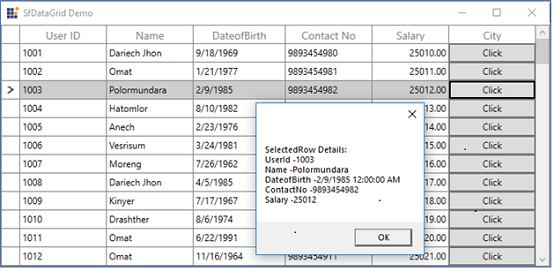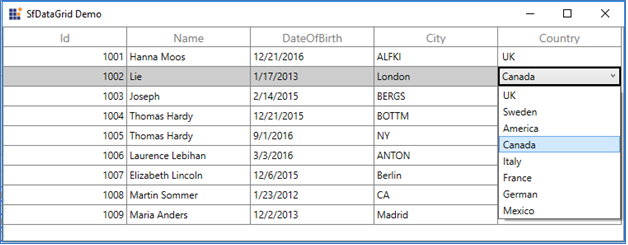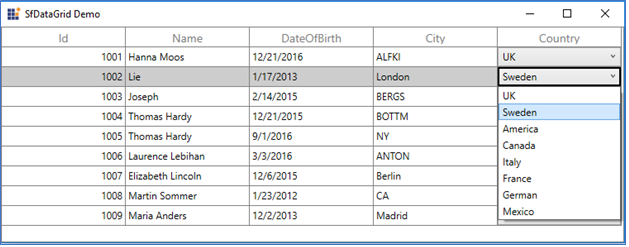How can I help you?
MVVM in WPF DataGrid (SfDataGrid)
27 Feb 202515 minutes to read
DataGrid SelectedItem Binding
You can bind the SelectedItem property directly to the DataGrid by setting the SfDataGrid.SelectedItem property.
<syncfusion:SfDataGrid x:Name="dataGrid"
AutoGenerateColumns="False"
SelectedItem="{Binding SelectedItem, Mode=TwoWay, UpdateSourceTrigger=PropertyChanged}"
ItemsSource="{Binding PersonDetails}"
NavigationMode="Cell"
ColumnSizer="Star"
SelectionMode="Extended"
ShowRowHeader="True">Whenever the SelectedItem is changed, the ViewModel property will get notified.
public class PersonModel : INotifyPropertyChanged
{
private object selectedItem;
public object SelectedItem
{
get
{
return selectedItem;
}
set
{
selectedItem = value;
RaisePropertyChanged("SelectedItem");
}
}
}You can download the sample here.
DataGrid SelectedItems Binding
You can bind the SelectedItems property directly to the DataGrid by setting the SfDataGrid.SelectedItems property.
<syncfusion:SfDataGrid x:Name="dataGrid"
Grid.Row="0"
AutoGenerateColumns="False"
SelectedItems="{Binding SelectedItems,Mode=TwoWay,UpdateSourceTrigger=PropertyChanged}"
ItemsSource="{Binding PersonDetails}"
NavigationMode="Cell"
ColumnSizer="Star"
SelectionMode="Extended"
ShowRowHeader="True">You can bind the SelectedItems from the ViewModel property.
class ViewModel:INotifyPropertyChanged
{
private ObservableCollection<object> _selectedItems;
public ObservableCollection<object> SelectedItems
{
get
{
return _selectedItems;
}
set
{
_selectedItems = value;
RaisePropertyChanged("SelectedItems");
}
}
}You can download the sample here.
Button command binding to ViewModel
You can load a button for the columns in the DataGrid by using GridTemplateColumn. When loading the buttons, you can bind command in ViewModel by using ElementName binding.
In the following example, ViewModel command receives the underlying data object as command parameter since the DataContext is binding as command parameter.
<syncfusion:SfDataGrid x:Name="sfGrid"
Grid.Row="1"
ColumnSizer="Star"
AllowEditing="True"
AutoGenerateColumns="False"
ItemsSource="{Binding UserDetails}"
ShowRowHeader="True">
<syncfusion:SfDataGrid.Columns>
<syncfusion:GridTemplateColumn MappingName="City" syncfusion:FocusManagerHelper.WantsKeyInput="True">
<syncfusion:GridTemplateColumn.CellTemplate>
<DataTemplate>
<Button Content="Click" syncfusion:FocusManagerHelper.FocusedElement="True"
Command="{Binding Path=DataContext.RowDataCommand,ElementName=sfGrid}" CommandParameter="{Binding}"/>
</DataTemplate>
</syncfusion:GridTemplateColumn.CellTemplate>
</syncfusion:GridTemplateColumn>
</syncfusion:SfDataGrid.Columns>
</syncfusion:SfDataGrid>
You can download the sample here.
Binding ComboBoxColumn ItemsSource from ViewModel
You can bind the ItemsSource from ViewModel to GridComboBoxColumn or GridMultiColumnDropDownList by using the ElementName binding.
<syncfusion:SfDataGrid x:Name="DataGrid"
AutoGenerateColumns="False"
ItemsSource="{Binding OrderList}"
NavigationMode="Cell">
<syncfusion:GridComboBoxColumn AllowEditing="True"
MappingName="Country"
HeaderText="Country"
ItemsSource="{Binding Path=DataContext.CountryList,
ElementName=DataGrid}" />
</syncfusion:SfDataGrid>class ViewModel:INotifyPropertyChanged
{
private ObservableCollection<string> countryList;
public ObservableCollection<string> CountryList
{
get
{
return countryList;
}
set
{
countryList = value;
RaisePropertyChanged("CountryList");
}
}
}
You can download the sample here.
Binding ViewModel ItemsSource to ComboBox inside data template
You can load the ComboBox inside the GridTemplateColumn and bind the ItemsSource from ViewModel to ComboBox by using the ElementName binding.
<syncfusion:SfDataGrid x:Name="DataGrid"
AutoGenerateColumns="False"
ItemsSource="{Binding OrderList}"
NavigationMode="Cell">
<syncfusion:SfDataGrid.Columns>
<syncfusion:GridTemplateColumn MappingName="Country" syncfusion:FocusManagerHelper.WantsKeyInput="True">
<syncfusion:GridTemplateColumn.CellTemplate>
<DataTemplate>
<TextBlock Text="{Binding Country}"/>
</DataTemplate>
</syncfusion:GridTemplateColumn.CellTemplate>
<syncfusion:GridTemplateColumn.EditTemplate>
<DataTemplate>
<ComboBox ItemsSource="{Binding Path=DataContext.CountryList, ElementName=DataGrid}" DisplayMemberPath="{Binding CountryList}"/>
</DataTemplate>
</syncfusion:GridTemplateColumn.EditTemplate>
</syncfusion:GridTemplateColumn>
</syncfusion:SfDataGrid.Columns>
</syncfusion:SfDataGrid>
You can download the sample here.
Binding DataGrid Columns from ViewModel
You can bind the SfDataGrid.Columns to a property in the ViewModel by having the binding property of type Syncfusion.SfGrid.UI.Xaml.Grid.Columns. Thus, you can set binding to the SfDataGrid.Columns property that provides DataContext of the DataGrid is ViewModel.
<Syncfusion:SfDataGrid x:Name="datagrid"
AutoGenerateColumns="False"
Columns="{Binding SfGridColumns, Mode=TwoWay}"
ItemsSource="{Binding ItemsCollection}"
ShowRowHeader="True" />Refer to the following code example in which the SfGridColumns is populated with some GridTextColumn when creating the ViewModel instance.
public class ViewModel
{
private Columns sfGridColumns;
public ViewModel()
{
SetSfGridColumns();
this.ItemsCollection = employeeDetails;
}
public ObservableCollection<BusinessObjects> ItemsCollection
{
get { return itemsCollection; }
set { itemsCollection = value;}
}
public Columns SfGridColumns
{
get { return sfGridColumns; }
set { this.sfGridColumns = value; }
}
/// <summary>
/// To generate the columns for SfDataGrid
/// </summary>
protected void SetSfGridColumns()
{
this.sfGridColumns = new Columns();
sfGridColumns.Add(new GridTextColumn() { MappingName = "EmployeeName" });
sfGridColumns.Add(new GridTextColumn() { MappingName = "EmployeeAge" });
sfGridColumns.Add(new GridTextColumn() { MappingName = "EmployeeSalary" });
sfGridColumns.Add(new GridTextColumn() { MappingName = "ExperienceInMonth" });
}
}You can download the sample here.